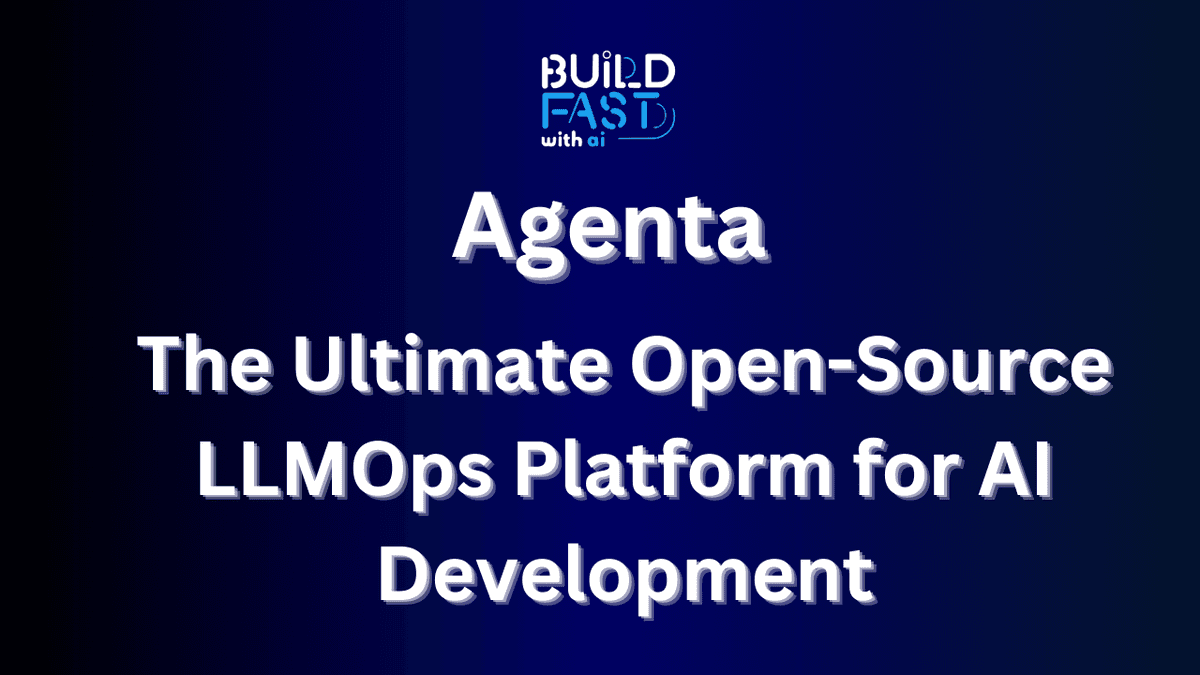Will you stand by as the future unfolds, or will you seize the opportunity to create it?
Be part of Gen AI Launch Pad 2025 and take control.
Introduction
As Large Language Models (LLMs) become more prevalent, managing their lifecycle effectively has become a crucial challenge. From development to deployment and monitoring, LLM-powered applications require robust infrastructure and tooling. Agenta is an open-source LLMOps platform designed to simplify this process, enabling developers to build, evaluate, and monitor LLM-based applications efficiently.
Agenta integrates seamlessly with modern AI workflows, supporting Retrieval-Augmented Generation (RAG), agent-based systems, and frameworks like LlamaIndex and LangChain. It provides extensive tools for prompt engineering, observability, and model evaluation, making it an ideal choice for AI engineers and researchers.
In this blog, we will explore:
- The core features of Agenta and how they simplify LLM operations.
- How to install and set up Agenta for your AI workflows.
- A detailed breakdown of various functionalities through hands-on coding examples.
- Best practices for observability and debugging with Agenta.
- Real-world applications and use cases where Agenta adds value.
By the end of this blog, you will have a comprehensive understanding of how Agenta enhances LLM development and deployment.
Core Features of Agenta
Agenta provides a rich set of functionalities tailored for AI engineers and data scientists working with large language models. Below are some of its most notable features:
1.Prompt Playground
The Prompt Playground allows users to experiment with and compare outputs from 50+ LLMs. This is particularly useful for testing different prompt structures and optimizing responses.
2.Custom Workflows
Agenta supports building custom workflows for Retrieval-Augmented Generation (RAG) and agent-based applications. These workflows can be easily defined, version-controlled, and deployed for production use.
3.LLM Evaluation
Evaluation is critical when working with LLMs. Agenta provides both built-in and custom evaluation mechanisms, enabling users to assess model performance using predefined metrics or their own evaluation strategies.
4.Human Evaluation
AI-generated content often requires human oversight. Agenta includes A/B testing and expert annotation tools to facilitate manual evaluations and ensure model accuracy.
5.Prompt Management
LLMs can be sensitive to prompt wording, making prompt management and version control essential. Agenta enables users to track prompt changes and compare different versions for optimization.
6.Observability & Tracing
Agenta enhances debugging and monitoring through observability and tracing tools. These help developers track how requests flow through their AI system, detect bottlenecks, and analyze model behavior in real-time.
Installing Agenta and Dependencies
Before diving into Agenta’s capabilities, we need to install the necessary dependencies.
Installation
pip install -U agenta openai opentelemetry-instrumentation-openai pip install opentelemetry-instrumentation-langchain langchain_community langchain_openai instructor litellm
Explanation
agenta: The core package that powers LLMOps capabilities.openai: Provides integration with OpenAI’s LLMs.opentelemetry-instrumentation-openai: Enables monitoring and tracing of OpenAI API calls.langchain,langchain_community,langchain_openai: Necessary for LangChain-based workflows and prompt management.instructor: Helps structure and validate responses from OpenAI models.litellm: A lightweight package for interacting with multiple LLM providers.
Why is this important?
These dependencies are essential for setting up an AI workflow that includes LLM execution, evaluation, and monitoring. By installing them, you ensure a robust environment for building and testing AI applications.
Setting Up API Keys
To interact with OpenAI and Agenta, we must configure API keys securely.
import os
from google.colab import userdata
os.environ['OPENAI_API_KEY'] = userdata.get('OPENAI_API_KEY')
os.environ['AGENTA_API_KEY'] = userdata.get('AGENTA_API_KEY')
os.environ['AGENTA_HOST'] = 'https://cloud.agenta.ai'
Explanation
os.environstores API keys securely as environment variables.userdata.get()retrieves API keys in Google Colab securely.AGENTA_HOSTpoints to Agenta’s cloud service for remote execution.
Why is this important?
Storing API keys in environment variables ensures security by preventing exposure in code repositories. This is a best practice for managing authentication credentials.
Initializing Agenta & OpenAI Client
After setting up API keys, we initialize Agenta and configure OpenAI instrumentation.
import agenta as ag from opentelemetry.instrumentation.openai import OpenAIInstrumentor from openai import OpenAI client = OpenAI() ag.init() OpenAIInstrumentor().instrument()
Explanation
ag.init(): Initializes Agenta for use.OpenAIInstrumentor().instrument(): Enables telemetry for OpenAI API calls, allowing developers to monitor request performance.OpenAI(): Creates a client for interacting with OpenAI models.
Why is this important?
This setup allows users to track and debug OpenAI-based requests efficiently. It is particularly useful for identifying latency issues and monitoring API usage.
Generating a Story Using OpenAI
Now, let's generate a simple story using GPT-3.5-turbo.
response = client.chat.completions.create(
model="gpt-3.5-turbo",
messages=[
{"role": "system", "content": "You are a helpful assistant."},
{"role": "user", "content": "Write a short story about AI Engineering."},
],
)
print(response.choices[0].message.content)
Expected Output
A short AI-generated story about AI engineering.
Explanation
- The model is set to
gpt-3.5-turbo, a widely used OpenAI model. - The system message defines the assistant’s persona.
- The user message requests a short story.
- The response is extracted from
response.choices[0].message.content.
Why is this important?
Generating structured responses is crucial for AI applications such as chatbots, automated storytelling, and virtual assistants.
Observability and Debugging with Agenta
Agenta enables detailed monitoring of AI workflows through OpenTelemetry.
import nest_asyncio
nest_asyncio.apply()
@ag.instrument(spankind="TASK")
async def generate_story_prompt(topic: str, genre: str):
return f"Write a {genre} story about {topic}."
Explanation
@ag.instrument(spankind="TASK"): Labels this function as a distinct task in a workflow.- The function generates a structured prompt dynamically.
Conclusion
Agenta provides a powerful toolkit for managing LLM workflows efficiently. From prompt engineering and workflow instrumentation to model evaluation and observability, Agenta ensures a seamless AI development experience.
For those working on AI-driven applications, integrating Agenta can significantly enhance debugging, monitoring, and performance optimization.
Resources
---------------------------
Stay Updated:- Follow Build Fast with AI pages for all the latest AI updates and resources.
Experts predict 2025 will be the defining year for Gen AI Implementation. Want to be ahead of the curve?
Join Build Fast with AI’s Gen AI Launch Pad 2025 - your accelerated path to mastering AI tools and building revolutionary applications.
---------------------------
Resources and Community
Join our community of 12,000+ AI enthusiasts and learn to build powerful AI applications! Whether you're a beginner or an experienced developer, our resources will help you understand and implement Generative AI in your projects.
- Website: www.buildfastwithai.com
- LinkedIn: linkedin.com/company/build-fast-with-ai/
- Instagram: instagram.com/buildfastwithai/
- Twitter: x.com/satvikps
- Telegram: t.me/BuildFastWithAI


